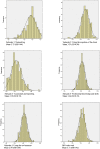How Competent Are Healthcare Professionals in Working According to a Bio-Psycho-Social Model in Healthcare? The Current Status and Validation of a Scale
- PMID: 27755561
- PMCID: PMC5068706
- DOI: 10.1371/journal.pone.0164018
How Competent Are Healthcare Professionals in Working According to a Bio-Psycho-Social Model in Healthcare? The Current Status and Validation of a Scale
Abstract
Background: Over the past decades, there has been a paradigm shift from a purely biomedical towards a bio-psycho-social (BPS) conception of disability and illness, which has led to a change in contemporary healthcare. However, there seems to be a gap between the rhetoric and reality of working within a BPS model. It is not clear whether healthcare professionals show the necessary skills and competencies to act according to the BPS model.
Objective: The aim of this study was (1) to develop a scale to monitor the BPS competencies of healthcare professionals, (2) to define its factor-structure, (3) to check internal consistency, (4) test-retest reliability and (5) feasibility.
Design and setting: Item derivation for the BPS scale was based on qualitative research with seven multidisciplinary focus groups (n = 58) of both patients and professionals. In a cross-sectional study design, 368 healthcare professionals completed the BPS scale through a digital platform. An exploratory factor analysis was performed to determine underlying dimensions. Statistical coherence was expressed in item-total correlations and in Cronbach's α coefficient. An intra-class-correlation coefficient was used to rate the test-retest reliability.
Results: The qualitative study revealed 45 items. The exploratory factor analysis showed five underlying dimensions labelled as: (1) networking, (2) using the expertise of the client, (3) assessment and reporting, (4) professional knowledge and skills and (5) using the environment. The results show a good to strong homogeneity (item-total ranged from 0.59 to 0.79) and a strong internal consistency (Cronbach's α ranged from 0.75 to 0.82). ICC ranged between 0.82 and 0.93.
Conclusion: The BPS scale appeared to be a valid and reliable measure to rate the BPS competencies of the healthcare professionals and offers opportunities for an improvement in the healthcare delivery. Further research is necessary to test the construct validity and to detect whether the scale is responsive and able to detect changes over time.
Conflict of interest statement
The authors have declared that no competing interests exist.
Figures
Similar articles
-
Quality in dementia care: A cross sectional study on the Bio-Psycho-Social competencies of health care professionals.PLoS One. 2018 Feb 1;13(2):e0191440. doi: 10.1371/journal.pone.0191440. eCollection 2018. PLoS One. 2018. PMID: 29389937 Free PMC article.
-
Measuring participation when combining subjective and objective variables: the development of the Ghent Participation Scale (GPS).Eur J Phys Rehabil Med. 2016 Aug;52(4):527-40. Epub 2015 Nov 27. Eur J Phys Rehabil Med. 2016. PMID: 26616357
-
Validation of the Policy Advocacy Engagement Scale for frontline healthcare professionals.Nurs Ethics. 2017 May;24(3):362-375. doi: 10.1177/0969733015603443. Epub 2015 Sep 22. Nurs Ethics. 2017. PMID: 26396141
-
[Psychometric characteristics of questionnaires designed to assess the knowledge, perceptions and practices of health care professionals with regards to alcoholic patients].Encephale. 2004 Sep-Oct;30(5):437-46. doi: 10.1016/s0013-7006(04)95458-9. Encephale. 2004. PMID: 15627048 Review. French.
-
Construction and validation of an instrument for evaluating Lean Healthcare in healthcare institutions.Rev Gaucha Enferm. 2024 Feb 12;45:e20230061. doi: 10.1590/1983-1447.2024.20230061.en. eCollection 2024. Rev Gaucha Enferm. 2024. PMID: 38359279 Review. English, Portuguese.
Cited by
-
Quality in dementia care: A cross sectional study on the Bio-Psycho-Social competencies of health care professionals.PLoS One. 2018 Feb 1;13(2):e0191440. doi: 10.1371/journal.pone.0191440. eCollection 2018. PLoS One. 2018. PMID: 29389937 Free PMC article.
-
A Qualitative Photo Elicitation Research Study to elicit the perception of young children with Developmental Disabilities such as ADHD and/or DCD and/or ASD on their participation.PLoS One. 2020 Mar 18;15(3):e0229538. doi: 10.1371/journal.pone.0229538. eCollection 2020. PLoS One. 2020. PMID: 32187183 Free PMC article.
-
Development of a toolkit to improve interprofessional collaboration and integration in primary care using qualitative interviews and co-design workshops.Front Public Health. 2023 Apr 17;11:1140987. doi: 10.3389/fpubh.2023.1140987. eCollection 2023. Front Public Health. 2023. PMID: 37139368 Free PMC article.
-
Association between competencies of biopsychosocial approach and job satisfaction of rehabilitation professionals in Ukraine.BMC Health Serv Res. 2022 Dec 16;22(1):1531. doi: 10.1186/s12913-022-08755-z. BMC Health Serv Res. 2022. PMID: 36527050 Free PMC article.
-
Biopsychosocial rehabilitation in the working population with chronic low back pain: a concept analysis.J Rehabil Med. 2024 Jan 16;56:jrm13454. doi: 10.2340/jrm.v56.13454. J Rehabil Med. 2024. PMID: 38226563 Free PMC article.
References
-
- Wade DT, Halligan P. New wine in old bottles: the WHO ICF as an explanatory model of human behaviour. Clinical Rehabilitation. 2003. July;17(4):349–54. - PubMed
-
- Williams SJ. Sociological imperialism and the profession of medicine revisited: where are we now? Sociol Health Illn. 2001;23(2):135–58.
-
- Engel GL. The need for a new medical model: a challenge for biomedicine. Science. 1977. April 8;196(4286):129–36. - PubMed
MeSH terms
LinkOut - more resources
Full Text Sources
Other Literature Sources
Medical
Miscellaneous




